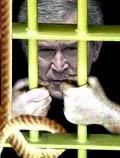| Find |
Thursday, 25 December 2008
U.S. Prepares To Hand Over Baghdad Base
A year ago, Forward Operating Base Callahan in northern Baghdad was one of the key U.S. military nerve centers in the battered capital. Hundreds of soldiers slept in crowded rooms. Humvees zipped in and out the gate around the clock to keep a vast network of inner-city outposts humming. On Christmas Eve, the few soldiers still there spent the day packing, emptying rooms and carting out boxes. Bulletin boards are bare. The dumbbells and workout equipment have been schlepped away.
On Christmas Eve, the few soldiers still there spent the day packing, emptying rooms and carting out boxes. Bulletin boards are bare. The dumbbells and workout equipment have been schlepped away.
Less than a week before the new year, which will usher in a largely undefined era for U.S. troops in Iraq, the military is preparing to hand over Callahan to the Iraqi government. It will be the first major base in Baghdad to be returned. The government has demanded that U.S. combat troops pull out of Iraqi cities by next summer.
The U.S. military plans to shut down by then five of the 13 large bases it operates in the capital, as well as the 15 combat outposts there that are occupied solely by U.S. troops.
Thousands of U.S. soldiers will remain based at joint security stations -- outposts they share with Iraqi Army or police units -- for the foreseeable future.
"On Jan. 1, our mission doesn't change," Brig. Gen. Robin Swan, a commander in the division responsible for Baghdad, said Wednesday during a visit to Callahan. Protecting the population remains the top mission, he said. "How we execute that mission is going to have adjustments."
For years, the U.N. resolution that is to be replaced Jan. 1 by a status-of-forces agreement between Iraq and the United States has given American forces vast power here. As the U.S. military starts shrinking its footprint in Baghdad and other key Iraqi cities, several questions remain about how the new arrangement will play out.
Starting next year, U.S. soldiers will no longer have the right to detain Iraqis without warrants issued by Iraqi judges, and they must turn over detainees to Iraqi authorities within hours.
Committees that will set guidelines on central issues, such as how combat operations are to be carried out and the instances when U.S. soldiers could be prosecuted under Iraqi law, have not been appointed.
"The Iraqis are still forming their committees," Gen. Ray Odierno, the top U.S. commander in Iraq, said this week. More
Posted at
10:56
![]()
Post Title: U.S. Prepares To Hand Over Baghdad Base
![[Zionazis-1.jpg]](https://blogger.googleusercontent.com/img/b/R29vZ2xl/AVvXsEg_x8DOGucgHQmfJJujuK_oYJdxhEnskhQqt-Og7lSk52HeaDQYzW8NQWfdpHmPgj_FJN0jJ3tz1prR1jVZHdHky2HDQxxcs4LVxX0DtAt3fG0sfRr6MDx7Sz8cJNjl0k0RS9TbCjangQ/s1600/Zionazis-1.jpg)




